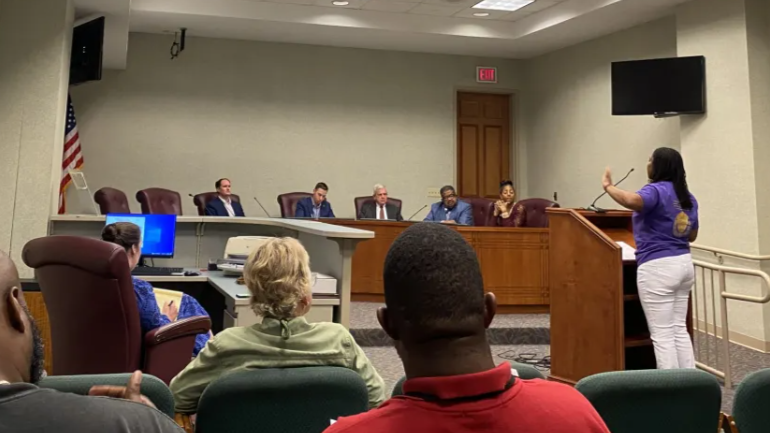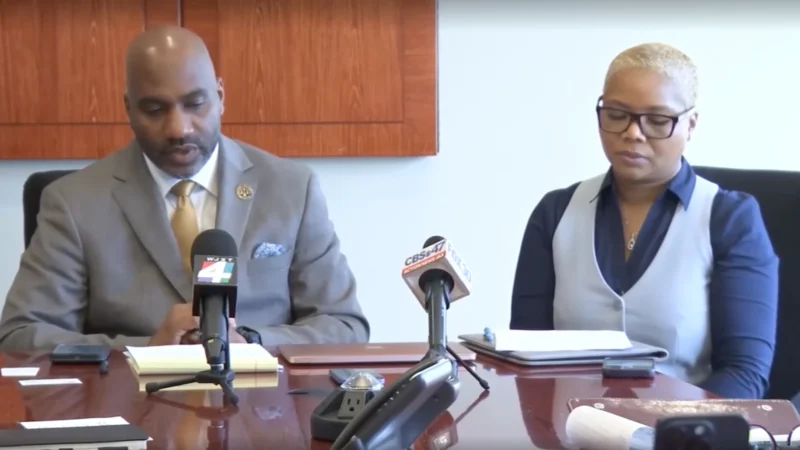The Jacksonville City Council will soon consider a proposed resolution condemning historic housing practices in the city that have discriminated against Black residents.
District 7 Councilman Jimmy Peluso, a Democrat elected in 2023, presented a draft of the resolution Tuesday to an audience of about 30 people, including four of his fellow council members.
He said he’d file the resolution, which says the city “recognizes that redlining is a historical reality,” next week. While the resolution itself won’t offer any policy change, Peluso said it’s one step the city needs to take as it reconsiders how to handle housing and economic development, particularly in Black-majority neighborhoods.
The resolution says “the impacts of historical redlining are still felt in wealth disparities among races today,” and “wealth disparities in homeownership, if left unaddressed, will entrench racial disparities for future generations.”
Redlining — a practice in which the federal government and private banks denied Black-majority neighborhoods access to financial services — openly pervaded the U.S. housing market from the 1930s to 1968, when the Fair Housing Act outlawed discrimination in real estate and mortgage lending.
Even after that discrimination was explicitly outlawed, Black and Hispanic lenders have still faced challenges in getting the same access to loans. The practice garnered new local attention last October when U.S. Attorney General Merrick Garland visited Jacksonville to announce a $9 million settlement between the Department of Justice and regional lender Ameris Bank. The Justice Department alleged Ameris had discriminated against Jacksonville’s Black and Hispanic residents in recent years through corporate policies that equate to redlining. Ameris denied the claims, saying it settled the case only to “avoid prolonged litigation.”
Peluso’s planned resolution is meant to “show that the City Council at the very least recognizes why certain neighborhoods have the disparities that they do as opposed to other parts of our city,” he said to open the talks Tuesday.
The draft resolution specifically named LaVilla, Durkeeville, Mixon Town, Sugar Hill, Eastside, Long Branch and Moncrief as communities hurt by redlining.
Four of Peluso’s peers on the 19-member City Council joined the public talks Tuesday in City Hall: Tyrona Clark-Murray, a Democrat, and Ken Amaro, Michael Boylan and Joe Carlucci, three of the council’s 14 Republican members.
Boylan asked the citizens who came what future policies they’d like to see, yet he tempered the idea that this resolution would offer any promises about the future.
“We are simply acknowledging the realities of what has historically happened in our community,” he said in opening comments. “I don’t want to set expectations that we won’t realize.”
Peluso agreed. “I really hope that we get the vast majority of [the] council behind us, so I want [the resolution] to be kind of broad. ‘Hey, we’re talking about what happened in the past, and why it’s affected us today.’ And then we can pass ordinances or maybe a few fixes as the year progresses to really kind of address those issues.”
Councilman Amaro said it was necessary “that we as the elected officials, in light of a recent settlement with a major bank, make a public statement as to our perspective on this horrific practice,” Amaro said.
Peluso said even without the recent settlement, the city needed to acknowledge the decades of discrimination. Most of the residents who spoke focused on how city lawmakers should follow the symbolic statement with concrete policies.
Dennise Cook, a local resident and activist, said impoverished neighborhoods need more separation from industrial properties, saying the environmental risks of such sites are less present in wealthier areas.
There’s a higher concentration of industrial zoning in ZIP codes like 32209, which is 90% Black, than exists in other parts of the city.
People who grow up in economically vibrant areas tend more often to return as adults and help sustain their childhood communities, resident Temisha Hill argued. That benefit is often lacking in places where the imprint of redlining still lingers. “Individuals that grow up in these areas that was once previously redlined, believing that they have no reason to come back home […] It makes it very difficult to retain our potential.”
“When I go to a shopping center, I’m going outside my neighborhood,” continued Hill, who serves as president of Unified Community Investors, a local nonprofit with a stated mission “to counter profit-led gentrification by revitalizing the Urban Core of Jacksonville. “Shopping centers should be available in every neighborhood in Jacksonville. Something to do should be available in every single neighborhood in Jacksonville. There shouldn’t be an area where there are community centers to keep the kids busy because there’s nothing else going on.”
Peluso is proposing smaller steps at this point. He outlined what he’s calling a “commercial corridors plan” that he said would focus on boosting outside investment in and around Black-majority neighborhoods. The city would carve out areas on the map and offer private entities new incentives to launch businesses within those areas, theoretically spurring new economic activity that raises property values for nearby homeowners.
“Pretty much like saying, hey, Kings (Road), Edgewood, Main (Street), A. Philip Randolph (Boulevard), Myrtle (Avenue) — these are areas where, if you want to put a business here, you’ll get this much in a grant from the city, pending a business plan,” Peluso told The Tributary.
Peluso called a public meeting of council members at the start of the new year to focus on his commercial corridors idea. He then wrote a recommended memo on the plan that’s now with the city’s Economic Development Commission “to make sure that it kind of passes the smell test.” Once that memo is finalized, he said he’ll send it out to the council and call another meeting to further iron out a potential policy.
The funding for incentives to businesses under this policy would come from the Northwest Jacksonville Economic Development Fund, Peluso said, meaning the city wouldn’t have to impose new taxes or tap outside sources of cash to pay for it.
“These are, like, grants for $50,000 to $100,000, smaller loans that they wouldn’t be able to get from a traditional creditor,” he said. “Frankly, I think it’s a better use of our Northwest Trust Fund dollars than what we’ve seen currently.”
Peluso acknowledged the symbolic resolution is far from a complete solution, but he said he hopes it will be the start of something bigger. “These are my neighborhoods too,” he said.
Lead image: Temisha Hill, president of Unified Community Investors, gives her opinion on Tuesday, Feb. 27, 2024, about a planned resolution to condemn historic redlining. She described deeper problems she says permeate her community due to generational housing discrimination. | The Tributary
This story is published through a partnership between The Tributary and Jacksonville Today.







